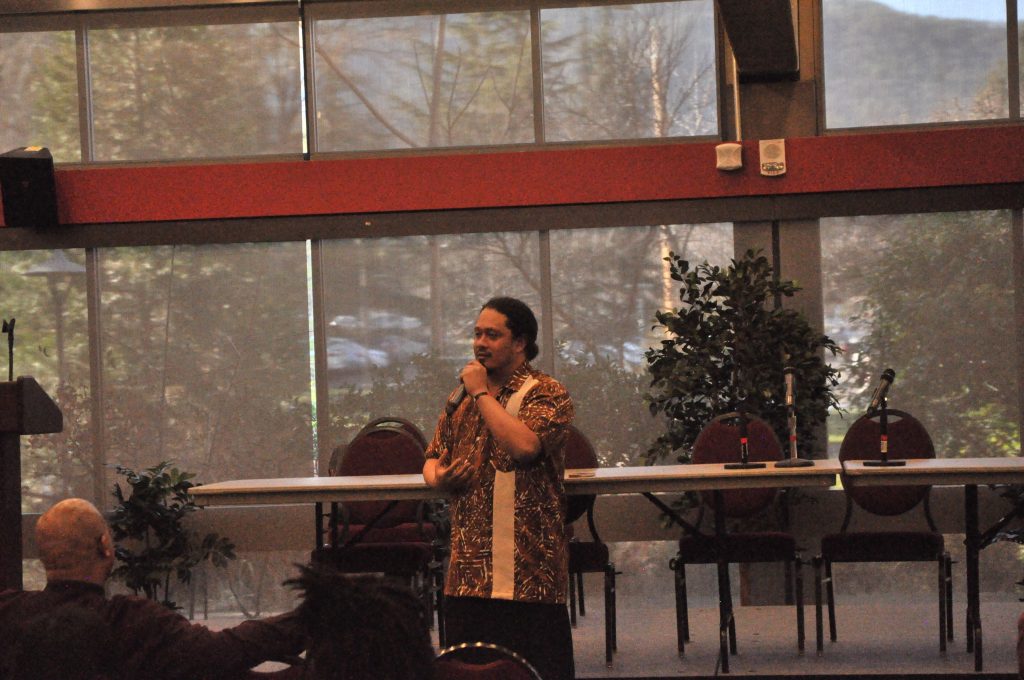 The Southern Oregon University (SOU) Ho’opa’a Hawai’i Club coordinated the Polynesian Education Conference in Stevenson Union on Friday, February 3— the only conference of its kind at a higher education institution to be completely student lead and run according to keynote speaker, Makerusa “Mak” Porotesano.
The Southern Oregon University (SOU) Ho’opa’a Hawai’i Club coordinated the Polynesian Education Conference in Stevenson Union on Friday, February 3— the only conference of its kind at a higher education institution to be completely student lead and run according to keynote speaker, Makerusa “Mak” Porotesano.
These events are something Porotesano would like to see more of around the country. “To see that they [the SOU community] are spending their resources on open dialogue and critical thinking around Pacific Islander identity is a huge first step,” he said. “I think it is just a telling step of the kind of support Southern Oregon is giving to the Pacific Islander Community.”
Porotesano is a second generation American Samoan from Portland who works in advocacy at the grassroots level for Pacific Islanders in higher education. He believes that the Pacific Education Conference is a kind of “Sacred-Space” for Pacific Islander Americans to speak their voice. He said providing more ‘Sacred-Spaces’ in higher education institutions could lead to the acquisition of more resources on campus to address Pacific-Islander American needs, as he has seen happen on other campuses.
When one hears the words ‘Hawaii’ or ‘Pacific Islands’ muttered, what do they think of? The six Polynesian-American, SOU-student panelists shared anecdotal microagressions they experience in the form of comments or actions which subtly and often unconsciously or unintentionally express a prejudiced attitude toward a member of a marginalized group.
During the discussion, students were given the chance to share their experiences overcoming struggles like these: living far from family and home; people not understanding or respecting their culture’s unique ways; losing those ways.
Student Panelist Nicole Kahawai remembered an encounter she had with another student when tabling for the event: “I told her we were tabling for the Pacific Education Conference, and she replied, ‘Oh, isn’t that just going to be a Hula party?’”
 Panelist Jeffrey Chun, Criminal Justice major and ROTC student, believes everyone can do their part to preserve their culture just by practicing it at home. “We come home and kiss each other on the cheek, and then a year goes by, and we are all just waving ‘Hi,” Chun said, referring to his forgetting to use the proper greeting at his home—a kiss on the cheek—over a traditional American wave or handshake when returning home from college on the mainland.
Panelist Jeffrey Chun, Criminal Justice major and ROTC student, believes everyone can do their part to preserve their culture just by practicing it at home. “We come home and kiss each other on the cheek, and then a year goes by, and we are all just waving ‘Hi,” Chun said, referring to his forgetting to use the proper greeting at his home—a kiss on the cheek—over a traditional American wave or handshake when returning home from college on the mainland.
 Complexities within Pacific-Islander American identity today are illustrative of what Darius Kila, Lead lead Raider Ambassador and student panelist at the conference, meant when he said, “It is toxic to equate language and culture.”
Complexities within Pacific-Islander American identity today are illustrative of what Darius Kila, Lead lead Raider Ambassador and student panelist at the conference, meant when he said, “It is toxic to equate language and culture.”
Only focusing on “tradition” ignores the fact that cultures change, and Western society’s glorification of indigenous “traditions” created many of the stereotypes that lead to microaggressions, in the first place.
Abigail Awai, a psychology major and the Lu’au Chair of the Ho’opa’a Hawai’i Club wanted the conference to teach others who do not consider themselves Pacific Islanders how to respect her culture. “I think respect for Polynesian culture, for Hawaiian culture—that’s all of our goals for today,” she said.
Porotusena concluded the conference wanting people to understand, from a Pacific Islander perspective, that taking the time and commitment to build strong relationships with their peoples is at the core to solving the problem of how we misrepresent other them in our minds. On that note, student panelists exclaimed the Polynesian Education Conference was a “collective success.”



